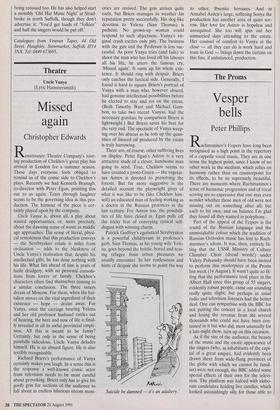Theatre
Uncle Vanya (Lyric Hammersmith)
Missed again
Christopher Edwards
Renaissance Theatre Company's tour- ing production of Chekhov's great play has arrived in London for a summer season. These days everyone feels obliged to remind us of the comic side to Chekhov's plays. Recently we had Kenneth Branagh, co-director with Peter Egan, pointing this out to us again. Tears through laughter seems to be the governing idea in this pro- duction. The humour of the piece is cer- tainly played upon by the company.
Uncle Vanya is, above all, a play about wasted opportunities, or, more precisely, about the dawning sense of waste as middle age approaches. The sense of literal, physi- cal remoteness that this production conveys — the Serebryakov estate is miles from civilisation — adds to the bleakness of Uncle Vanya's realisation that, despite his intellectual gifts, he has done nothing with his life. What lies ahead of him is years of futile drudgery, with no personal consola- tions from lovers or family. Chekhov's characters often find themselves coming to a similar conclusion. The three sisters dream of Moscow. For them, when the bat- talion moves on the vital ingredient of their existence — hope — drains away. For Vanya, once the carriage bearing Yelena and her old professor husband rattles out of hearing, the here and now of life is final- ly revealed in all its awful provincial empti- ness. All this is meant to be funny? Certainly, but only in the sense of being painfully ridiculous. Uncle Vanya deludes himself. He is an absurd figure. He is also terribly recognisable.
Richard Briers's performance of Vanya certainly makes you laugh. In a sense this is the response a well-known comic actor from television needs to be most careful about provoking. Briers only has to give his goofy grin for sections of the audience to fall about as endless hilarious sitcom mem- ories are revived. The grin arrives quite early, but Briers manages to weather his reputation pretty successfully. His dog-like devotion to Yelena (Sian Thomas) is pathetic. No grown-up woman could respond to such abjectness. Vanya's vir- ginal crush excites only pity. The business with the gun and the Professor is less suc- cessful. As poor Vanya tries (and fails) to shoot the man who has lived off his labours all his life, he utters the famous cry, `Missed again'. It sums up his whole exis- tence. It should ring with despair. Briers only catches the farcical side. Generally, I found it hard to square Briers's portrait of Vanya with a man who, however absurd, had genuine intellectual possibilities before he elected to stay and rot on the estate. (Both Timothy West and Michael Gam- bon, to take two recent Vanyas, had the necessary gravitas; by comparison Briers is lightweight.) But Briers saves his best for the very end. The spectacle of Vanya weep- ing over his abacus as he tots up the quan- tities of linseed oil produced by the estate is truly harrowing.
There are, of course, other suffering lives on display. Peter Egan's Astrov is a very attractive study of a clever, handsome man going to seed. True, Chekhov seems to have created a proto-Green — the vegetar- ian Astrov is devoted to preserving the forests. But far more suggestive is the detailed account the playwright gives of what it was like to be (like Chekhov him- self) an educated man of feeling working as a doctor in the Russian provinces in the last century. For Astrov too, the possibili- ties of life have clOsed in. Egan pulls off the tricky feat of conveying cynical self- disgust with winning charm.
Patrick Godfrey's egotistical Serebryakov is a powerful child/tyrant in professor's garb. Sian Thomas, as his young wife Yele- na, goes beyond the brittle, bored and teas- ing refugee from urban pleasures we usually encounter. In her restlessness and hints of despair she seems to point the way
Suicide be damned — it's an adultery.'
to other, Ibsenite heroines. And in Annabel Arden's large, suffering Sonya the production has another area of quiet sor- row. Her love for Astrov is hopeless and unrequited. She too will spin out her unmarried days attending to the estate. Her counsel of comfort to Vanya at the close — all they can do is work hard and trust in God — brings down the curtain on this fine, if unbalanced, production.


















































 Previous page
Previous page